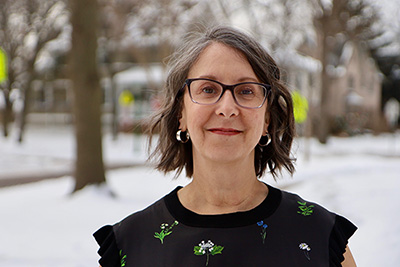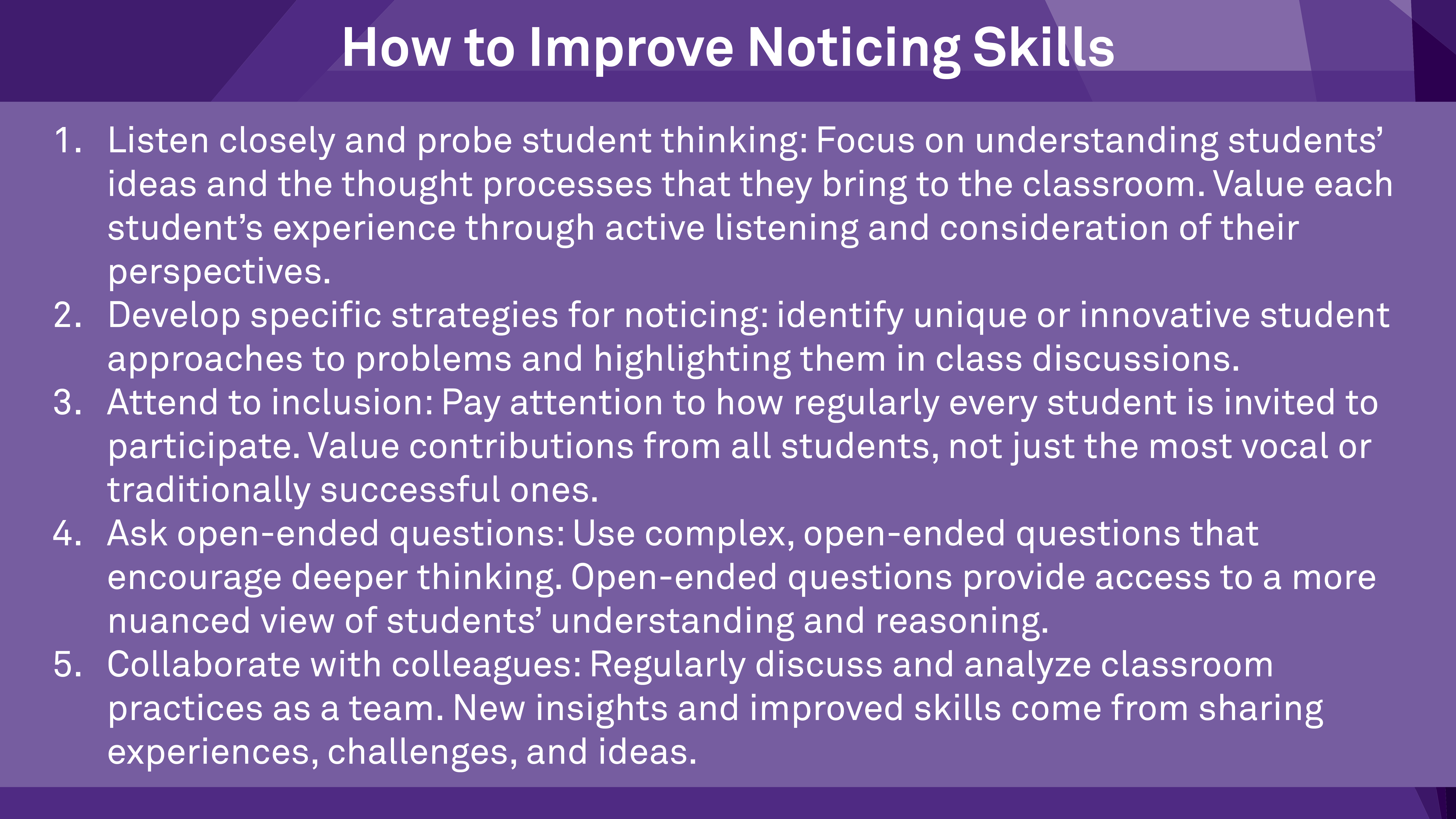“Teacher Noticing” Promotes Responsive, Personalized Instruction
By Dr. Susan Corwith, CTD Director
 At CTD we study and implement the talent development framework. While much of our focus is on students, we know that educators are the backbone of the talent development process. In fact, a finding from my own dissertation work is that educators’ skill, engagement, and ability to reflect on their own learning is a critical component in talent development. This is one reason Professor Miriam Sherin’s research, which focuses on teacher learning, is fascinating
At CTD we study and implement the talent development framework. While much of our focus is on students, we know that educators are the backbone of the talent development process. In fact, a finding from my own dissertation work is that educators’ skill, engagement, and ability to reflect on their own learning is a critical component in talent development. This is one reason Professor Miriam Sherin’s research, which focuses on teacher learning, is fascinating
to me.
I had the opportunity to speak with Sherin, Associate Provost for Undergraduate Education and Alice Gabrielle Twight Professor of Learning Sciences at Northwestern, about her work with teachers and the concept of “teacher noticing”.
What is Teacher Noticing?
Teacher noticing refers to a teacher’s ability to actively observe and interpret what is happening in their classroom in real-time. It involves being aware of and responding to various elements simultaneously, such as student behavior, interactions, and learning progress. “Teachers need to decide where to focus their attention and where not to focus their attention. I think that's really a form of teacher expertise that can be really valuable,” says Sherin. Teachers who practice effective teacher noticing attend to students' individual actions, interactions, and responses, looking for patterns and potential learning opportunities amidst the complexity, dynamics, and pace of a classroom environment.
Center for Talent Development at Northwestern · The Main Components of Teacher Noticing
Why Teacher Noticing Matters
“The research is pretty clear that your teacher matters,” says Sherin. Studying how teachers think and learn and understanding the connection between teacher thinking and student learning is crucial because of the significant role educators play in shaping students' academic and social-emotional development. If we understand the intricacies of teacher noticing in classrooms, it is easier to support educators in their efforts to create engaging and effective learning environments for all students.
Educators want students to engage in metacognition – or thinking about their own thinking. Sherin notes the practices that surround teacher noticing, like attending to student thinking and looking at students’ identities, contribute to both teachers’ and students’ awareness of what they're doing. In terms of the teacher’s experience, “If you're a teacher, that's part of the work of preparing to notice. ‘What am I going to be on the lookout for? When am I going to be listening to students?’ I think that's very metacognitive.”
Educators gain valuable insights into their students’ academic and emotional needs through teacher noticing. This deeper level of understanding allows teachers to tailor their instruction to meet each student where they are, effectively addressing their strengths, areas for growth, and individual learning preferences. Sherin emphasizes that teacher noticing goes beyond surface-level observation; it involves a deliberate and reflective process of making sense of what is observed and using that understanding to inform instructional decisions.
Using Teacher Noticing to Leverage Student Strengths and Promote Equity
At CTD we also talk with educators about “talent spotting”, which involves observing student behaviors and responses when they are provided with challenging, inquiry-based activities. Teacher noticing seems to align with this focus on finding and leveraging strengths. “I think there's a lot of rhetoric around teachers making quick judgments on students’ ability and also thinking of students’ ability as static. ‘This is a low student. This is a high student.’ And yet we know that's not actually how it works,” says Sherin. “Students’ thinking is very dynamic… I think that when you are open to noticing what students are doing, it can help a teacher consider students’ strengths.”
Center for Talent Development at Northwestern · The Correlation Between Student Learning And Teacher Noticing
Sherin and other researchers studying teacher noticing have found that helping teachers understand and appreciate student thinking increases their focus on what students can do and enhances their ability to create classrooms where all students can share their ideas and develop their identities as learners. Using the assets students bring to a classroom and exploring how they think about themselves and their learning results in teachers providing more student-centered and equitable instruction.
For example, in mathematics—the domain in which Sherin works—students are encouraged to see themselves as sources of mathematical knowledge, rather than relying solely on textbooks. Teachers are taught to examine process, not just answers, and consider how and why they select which student ideas to share with the whole class. Sherin explains, “You might engage students around describing the mathematics in an idea or you could highlight an interesting representation or unusual approach. Or maybe you want to share the approach that most students did, because they will connect with it.” Encouraging teachers to ask different types of questions opens opportunities for deeper thinking and collaboration that can further enhance student engagement. By building on what teachers are already doing well and helping them see the value in understanding their current practices, educators can develop more equitable and enriching classrooms.
Using Teacher Noticing to Improve Learning Environments
Sherin’s research demonstrates that as teachers engage in improved noticing practices, they solicit more ideas from the class than they did before, and they spend more time discussing student ideas. Teachers report that they have an improved ability to respond to and probe students’ ideas in real time and to plan proactively to look for student thinking to assess understanding and learning readiness. By acknowledging and validating students' unique identities and experiences, teachers celebrate diversity, promote mutual respect among students, and encourage breadth of ideas.
Center for Talent Development at Northwestern · The Importance Of Paying Attention
“When I work with teachers around noticing, they often think that the thing they should be noticing is about themselves. A few years ago, pre-pandemic, there was a big ‘observe me’ movement. It was very teacher focused, and I really believe that if teachers would pay more attention to what their students are doing, rather than what they are doing [as teachers], that would open up their teaching practices in a different way. It's not that what a teacher does is not important—it's critically important—but I think we can only go so far in our teaching if we're just paying attention to ourselves.”
Educators have the power to transform learning experiences and help more young people reach their full potential. To do that, we must develop our skills to observe, understand, and respond to the diverse needs of our students.

Talent Scouting Beyond the Classroom
Talent spotting involves keenly observing student behaviors and responses when they engage in challenging activities that interest them. Since opportunity and access impact ability, this work to find and nurture potential, both in school and outside of school, is critical and something that CTD emphasizes with families and other adults who work with young people. In this blog post, Tammie Stewart, Outreach Manager, shares her own talent development journey and recommendations for becoming an effective talent scout.
Read the full CTD blog: https://www.ctd.northwestern.edu/blog/become-talent-scout
Explore Talent Development and Gain Advocacy Skills | Online Boot Camp for Parents
There is still time to register for CTD’s Summer Boot Camp for Parents where you can learn about current research on talent development and giftedness, the role of parents and other caring adults in supporting talent development, and how academic enrichment, acceleration, and other forms of programming promote talent development both inside and outside of schools. This online, asynchronous program with two optional live, online sessions begins July 15. Learn more and register online.

